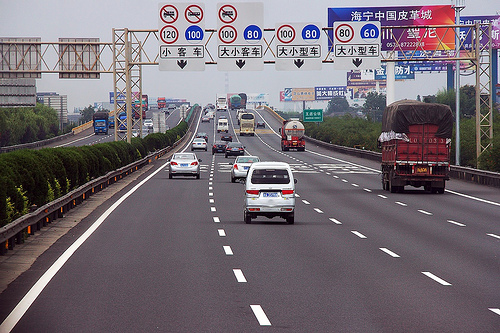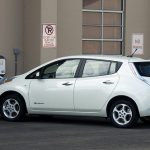New laws in China to encourage electric vehicle production
China used to be a country of cyclists. Fifty years ago, cars were such a rare sight that young boys would idle at street corners in Beijing, hoping one would drive by just so they could get a whiff of the foreign scent of petrol. Today China is becoming a nation of cars, second only to the United States in annual auto sales.

China’s carbon consumption has increased over the past twenty years, keeping pace with development, so the government is eyeing low-emissions solutions. From Flickr’s jo.sau.
But car culture in China is different than in America, where cars are associated with freedom and the lure of the open road. In China, they are inextricably tied to status. Roll up in an Audi and you’re accorded a basic level of respect; pull up in a domestic Chery QQ hatchback and . . . fuhgeddaboutit.
Such attitudes extend to all spheres of life — business and romance. “If a girl can see you didn’t drive to pick her up, she won’t bother coming out,” Zhang Penghao, 24, told The Guardian. “I don’t understand why it’s so important, either. It’s women — or really the women’s parents — who care.”
His observation of the way different generations view cars speaks to concerns younger Chinese have about the environment. The rapid rise of the auto industry in China — vehicle sales rose 45% in 2009 alone — has been blamed for the country’s worsening air pollution, though heavy industry is a bigger culprit.
Darker associations follow — cronyism, materialism, elitism — with many of the nation’s millionaires (who number 1 million and counting) eager to display their wealth through luxury vehicles. When Rolls-Royce released its limited edition Phantom, a model priced at $1.2 million, all eight sold in China within two months.
More cars also mean more road deaths. According to the police, more than 60,000 die in road accidents every year in China, but the figure should be more than four times higher, according to national disease surveillance system statistics.
“We all rode bikes in the past, and you could cycle as you pleased. There were no specific lanes,” said Shi Jing, a road safety expert at Tsinghua University in Beijing. “Today people are not used to the car rules and still drive as they please, scrambling to get right of way.”
Although it is a police state, China has struggled to govern road behavior — indeed, the government has struggled to control the overall effects of the auto industry. On the one hand, cars have an impressive multiplier effect compared to other sectors. Auto manufacturers stimulate steel production and other business-to-business relationships, while gas stations and dealerships proliferate on the consumer side.
The government must balance those economic benefits with other concerns, like quality of life and health. Lung cancer rates in China have spiked in recent years, and while the evidence linking lung cancer to outdoor air pollution is inconclusive, the World Health Organization took the unprecedented step last year of labeling it a carcinogen. The move has troubling connotations for a country working to lower pollution rates.
It’s hoping one tactic will help: permitting new makers of electric vehicles (EVs) into China’s auto market. Currently, EV manufacturers must purchase an automaker to receive an EV-manufacturing permit. The government is developing new legislation that would revise that requirement and allow other businesses besides carmakers to enter the Chinese market. The National Development and Reform Commission aims to have the revised policy completed by the end of the year.
Related Posts
Category: News, Transportation

















